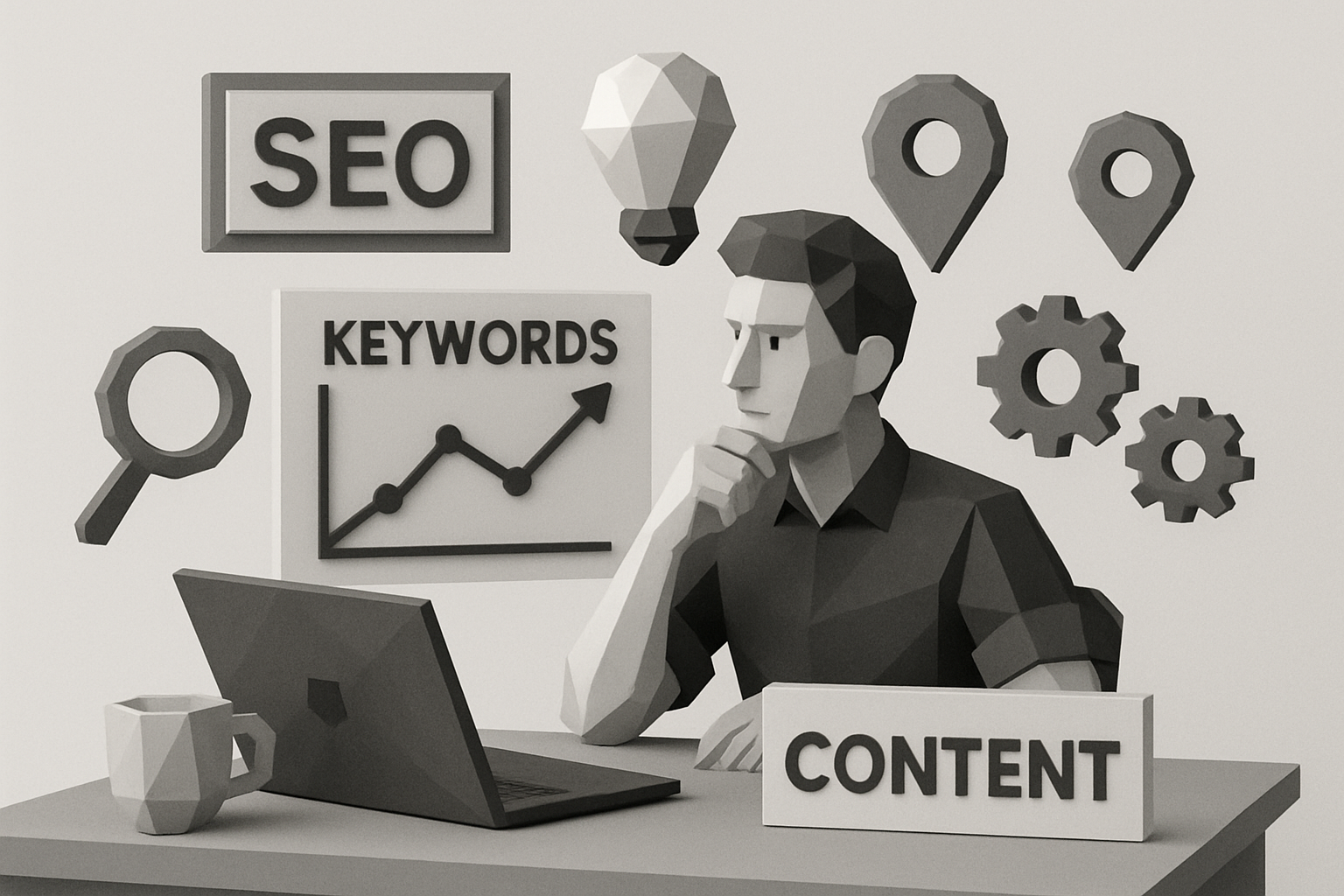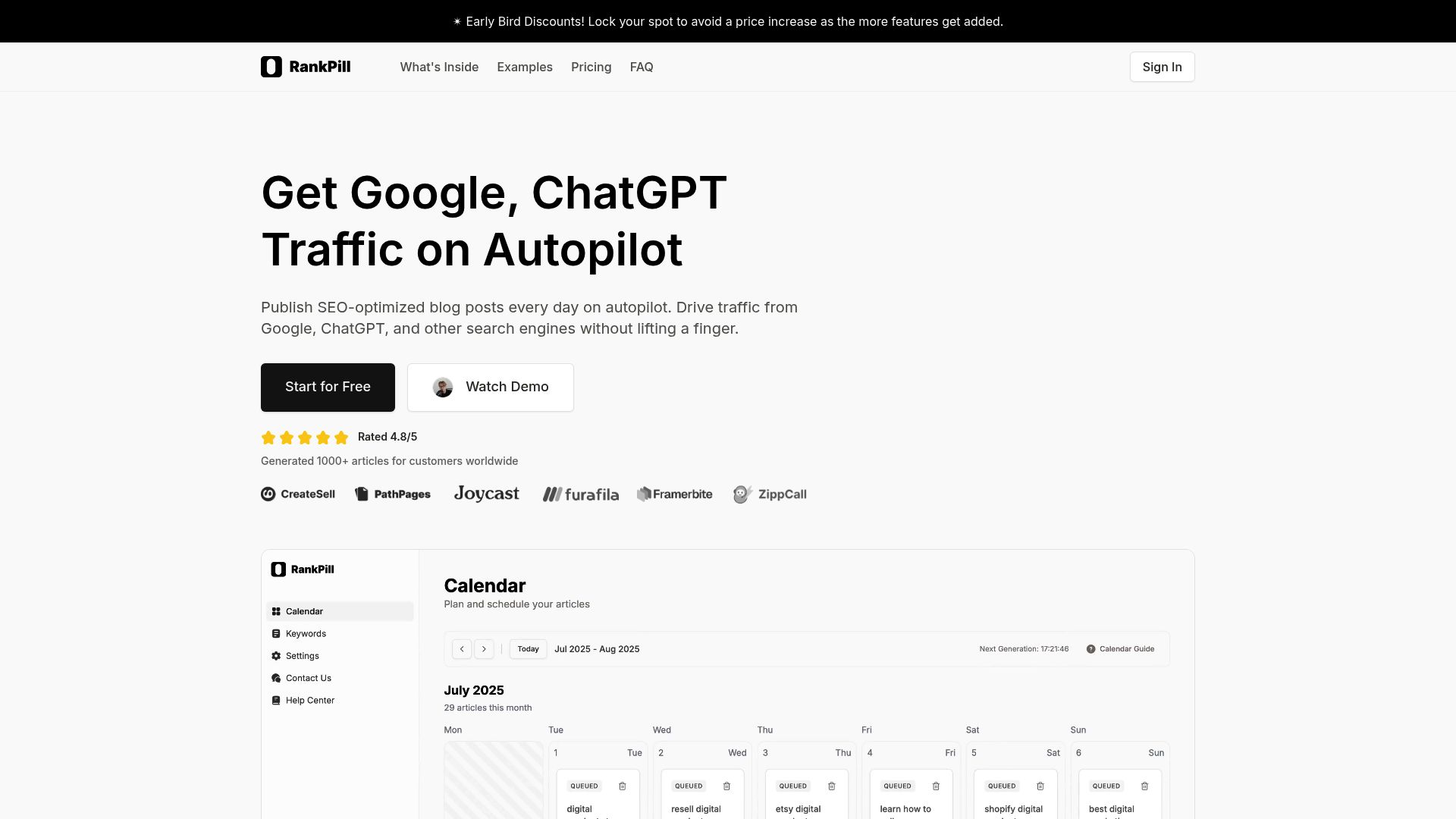Struggling to get your business noticed online in 2025? You're not alone. Over 90% of websites never receive a single visitor from organic search—making visibility one of the toughest challenges for entrepreneurs today.
The competition for online attention is fierce, and the small business SEO landscape keeps evolving. But what if you had a clear, step-by-step roadmap to help your business rise above the noise?
This essential handbook is designed to guide you through small business SEO in 2025. You'll discover the latest fundamentals, actionable strategies, must-have tools, and expert tips created specifically for small business owners.
Ready to unlock more traffic, leads, and sales? Dive in, take action, and transform your local presence with practical SEO tactics that drive real results.
Understanding Small Business SEO in 2025
Getting found online is tougher than ever for small businesses. In 2025, the rules of the SEO game have shifted, making it essential to understand how small business seo stands apart from traditional strategies. Let’s break down what you need to know for success this year.

What is Small Business SEO?
Small business seo is a focused strategy designed to help local companies stand out in search results. Unlike general SEO, which aims for broad, often national visibility, small business seo zeroes in on attracting customers from a specific location or community.
In 2025’s digital-first world, showing up in local searches can make or break a business. For example, a hardware store in Texas benefits more from ranking for “hardware store near me” than trying to compete with national chains. This is where local map pack rankings, organic listings, and location-based searches become critical.
Here’s a quick comparison:
| Ranking Type | What It Means | Example Search |
|---|---|---|
| Organic | Standard blue links in search results | “best hardware tools” |
| Local | Results tailored to a user’s location | “hardware store in Austin” |
| Map Pack | Featured map & top 3 local listings | “hardware store near me” |
Only 0.63% of Google users click results on page two (Backlinko, 2025). That’s why mastering SEO for small businesses guide is vital to compete locally.
The Evolving SEO Landscape
The world of small business seo is changing fast. Between 2024 and 2025, AI has become a major player in how search engines decide which businesses to showcase. Google’s latest algorithm updates now prioritize user intent, helpful content, and local relevance more than ever.
Voice search and mobile-first indexing are also reshaping the playing field. More people now ask their phones for “best coffee shop nearby” instead of typing queries. Zero-click searches—where Google answers questions directly on the results page—mean fewer clicks to websites, so it’s critical to optimize for featured snippets and local panels.
Adapting quickly to these trends is the only way for small businesses to stay ahead. Embracing automation, AI, and up-to-date best practices will keep your small business seo strategy effective in this evolving landscape.
Why Small Businesses Can't Ignore SEO
Ignoring small business seo in 2025 is like locking your storefront during business hours. According to Statista, 1 in 5 customers discover a store after an online search. SEO is not only more cost-effective than paid ads for limited budgets, but it also drives both website visits and physical foot traffic.
Common misconceptions and mistakes include:
- Believing SEO is a one-time task
- Ignoring mobile optimization
- Using inconsistent business information across platforms
- Overlooking the power of customer reviews
Avoiding these pitfalls means more visibility, trust, and customers for your business. Investing in small business seo is no longer optional—it’s essential for growth.
Building Your Small Business SEO Foundation
Starting your small business seo journey means building a strong digital foundation. Think of your website and online presence as your storefront—if it’s hard to find or messy, customers will turn away. Let’s break down the essential pillars you need for lasting results.

Creating a High-Quality, SEO-Ready Website
A high-quality website is the heart of any small business seo strategy. Start by ensuring your site is easy to navigate—visitors should find what they need in just a few clicks. Fast loading times are critical. If your site takes more than three seconds to load, many users will leave before seeing your offer.
Mobile responsiveness is no longer optional. With most searches happening on smartphones, your site must look and work great on any device. This not only improves user experience but also boosts your rankings.
Represent your brand clearly. Use professional images, concise messaging, and highlight your unique products or services. Consider this example: A local bakery’s old website had cluttered menus and slow load times. After a redesign focusing on speed, mobile layout, and clear calls to action, their organic traffic doubled within months.
Key website elements:
- Clear navigation menu
- Fast load times (under 3 seconds)
- Mobile-friendly design
- Accurate, engaging content
- Visible contact information
Building this foundation sets the stage for effective small business seo that drives real results.
Setting Up Essential SEO Tools
No small business seo plan is complete without the right tools. Start by connecting your website to Google Analytics and Google Search Console. These free platforms let you monitor traffic, track keywords, and spot site issues.
Claim and optimize your Google Business Profile—this is vital for showing up in local searches and map packs. For broader reach, set up Bing Places and Apple Business Connect. Use Google Keyword Planner to discover what your customers are searching for in your area.
Here’s a quick comparison of free and premium tools:
| Tool Name | Free Version | Premium Features |
|---|---|---|
| Google Analytics | Yes | N/A |
| Google Search Console | Yes | N/A |
| Google Keyword Planner | Yes | Limited data, ads integration |
| Bing Places | Yes | N/A |
| Apple Business Connect | Yes | N/A |
| SEMrush, Ahrefs, Moz | No | Advanced tracking, competitor |
For most small businesses, free tools are enough to get started. If you want more in-depth analysis, paid platforms offer advanced features. For actionable strategies, check out these best SEO for small business tips.
NAP Consistency and Local Listings
NAP stands for Name, Address, and Phone number. Consistency across all listings is crucial for small business seo. If your business details are different on Google, Yelp, or Bing, search engines might lower your rankings or confuse potential customers.
Incorrect NAP data can result in lost leads and fewer in-store visits. To avoid this, claim and update your listings on major platforms like Google, Yelp, Bing, and industry directories. Double-check that your business information matches everywhere online.
Here’s what happens when a business fixes NAP errors: A local gym updated their address across all directories. Within weeks, their local search visibility improved, and more customers found accurate directions.
Steps to ensure NAP consistency:
- Audit all existing online listings
- Update and correct discrepancies
- Monitor regularly for changes
- Optimize profiles with photos and descriptions
By maintaining accurate NAP data, you’ll help customers find you easily and boost your small business seo efforts.
Keyword Research & Content Strategy for Small Businesses
Getting started with small business seo means understanding what your customers are searching for and how to stand out from the crowd. The right keywords and a focused content plan are your foundation for success. Let's dive into how you can uncover opportunities, create content that converts, and leverage technology to stay ahead.

Finding the Right Keywords for Your Business
Effective small business seo starts with smart keyword research. You want to target phrases your ideal customers use, but avoid overcrowded terms dominated by large competitors. Focus on high-intent, low-competition keywords that match your products or services.
Local modifiers are crucial. Add phrases like "near me," your city, or neighborhood to capture local traffic. For example, an HVAC company in Virginia should target "HVAC repair Virginia" or "emergency AC service Richmond." These specific terms attract buyers ready to take action.
Don't forget to analyze your competitors. Use tools to see which keywords nearby businesses rank for, then find gaps you can fill. Platforms like Best SEO Tools of 2025 can help you compare keyword difficulty, search volume, and trends. By focusing on the right keywords, your small business seo efforts will have a much bigger impact.
Creating Content That Ranks and Converts
Once you have your keywords, it's time to build valuable content. Google rewards helpful, relevant, and up-to-date information. For small business seo, this means writing content that answers real customer questions and supports their buying journey.
Mix up your content types to reach different audiences. Blog posts can address common questions or showcase your expertise. FAQs help capture voice and long-tail searches. Service pages should clearly explain what you offer and highlight local relevance.
Avoid keyword stuffing. Instead, write naturally and focus on what your customers want to know. For example, a bakery could share recipes or highlight seasonal specials. A law firm might publish guides on local regulations. Fitness studios can post workout tips or success stories. The right content not only boosts your rankings but also builds trust with your audience.
Leveraging AI-Powered SEO Content Platforms
Small business seo doesn't have to be overwhelming. AI-powered tools are changing the game by automating keyword research, content creation, and even publishing schedules.
If your time and resources are limited, these platforms can generate optimized blog posts, suggest new topics, and ensure your website stays fresh. Imagine setting up a content calendar and letting the technology handle the heavy lifting. This allows you to focus on running your business while still growing your online presence.
AI-driven solutions can also help you analyze competitors, monitor keyword trends, and refine your strategy. By embracing these tools, you make small business seo more efficient and effective, keeping you one step ahead of local competitors.
On-Page & Technical SEO Essentials
Mastering on-page and technical fundamentals is the backbone of small business seo in 2025. Without a strong foundation, even the best content can go unnoticed. Let’s break down the essentials you need to get found by local customers and outshine your competition.
Optimizing Website Structure and Metadata
Your website structure sets the stage for small business seo success. Start by ensuring your URLs are clean, descriptive, and easy to read. For example, use /services/hvac-repair instead of /page?id=123. This makes it easier for both users and search engines to understand your content.
Title tags and meta descriptions are your first impression in search results. Craft unique, compelling tags for every page. Include your main keywords and location if relevant. Use header tags (<h1>, <h2>, <h3>) to organize content and reinforce important topics for small business seo.
Don’t forget image optimization. Compress files for faster loading, use descriptive alt text, and choose relevant filenames. Here’s a quick comparison:
| Element | Optimized Example | Unoptimized Example |
|---|---|---|
| URL | /services/hvac-repair | /page?id=123 |
| Title Tag | HVAC Repair in Virginia | Home |
| Image Filename | hvac-repair-virginia.jpg | IMG_0012.jpg |
A well-structured, optimized site boosts your small business seo and creates a better user experience.
Mobile Optimization and User Experience
Most searches now happen on mobile, making mobile responsiveness non-negotiable for small business seo. Your website must look great and function smoothly on every device. Use a responsive design that adapts layouts and text sizes for phones and tablets.
Site speed is critical. Compress images, minimize code, and use fast hosting to keep load times under three seconds. Google rewards fast, mobile-friendly sites with higher rankings, so every second counts.
Poor mobile user experience can tank your small business seo efforts. Frustrating navigation, tiny buttons, or slow pages will drive visitors away. Prioritize simple menus, clear calls to action, and easy-to-read text. Test your site regularly on multiple devices to catch issues early.
By focusing on mobile optimization, you’re not just improving rankings—you’re making it easier for customers to connect with your business wherever they are.
Technical SEO Fundamentals for Small Businesses
Technical SEO ensures your website is accessible, crawlable, and ready to rank. Start with an XML sitemap and a properly configured robots.txt file. These help search engines index your pages accurately, which is crucial for small business seo.
Fix common technical errors like broken links, duplicate content, and slow load times. Use internal linking to guide visitors (and search engines) to your most important pages. Implement schema markup to enhance your local business listings and stand out in the map pack.
For example, adding local business schema might look like this:
{
"@context": "https://schema.org",
"@type": "LocalBusiness",
"name": "Your Business Name",
"address": {
"streetAddress": "123 Main St",
"addressLocality": "Your City",
"addressRegion": "VA"
},
"telephone": "+1-555-123-4567"
}
Not sure where to start? Check out this small business SEO services overview to explore tools and solutions tailored for your needs. Mastering these technical essentials will keep your small business seo ahead of the curve and ready for long-term growth.
Local SEO: Winning in Your Community
Getting noticed locally is crucial for small business seo in 2025. With more customers searching for businesses nearby, local SEO can put your brand in front of the right people at the perfect moment. Missing out means letting competitors win your community’s attention.
Google Business Profile Optimization
Your Google Business Profile is the digital storefront for your small business seo efforts. Claiming and optimizing your profile puts you on the map—literally.
Start by claiming and verifying your listing. Fill in every detail: business name, address, phone, hours, and website. Select the right categories and upload high-quality photos. Add services, products, and keep hours updated.
Respond to reviews and post regular updates. For example, a bakery that posts weekly specials and responds to every review will attract more foot traffic and online orders. Optimized profiles often appear in the local “map pack,” making you the first choice for searchers.
Building Local Citations and Backlinks
Local citations—mentions of your business name, address, and phone—are vital for small business seo. They build credibility and help search engines verify your location.
List your business on platforms like Yelp, Bing Places, and industry directories. Make sure your information is consistent everywhere. Inconsistent citations confuse both customers and search engines.
To build backlinks, partner with local organizations, sponsor community events, or get featured in local news. These links signal trust and authority, boosting your rankings. Use tools to track and manage your citations for ongoing accuracy.
Gathering and Leveraging Customer Reviews
Customer reviews are a cornerstone of small business seo. Positive feedback builds trust and influences buying decisions. In fact, businesses with higher ratings see more clicks and calls. According to Local SEO Statistics for 2025, reviews are one of the top factors for local search visibility.
Encourage reviews through email follow-ups, in-store signs, or after-purchase texts. Always reply—thank happy customers and address concerns professionally. A steady stream of new reviews signals an active, trustworthy business.
When you showcase reviews on your site and Google profile, you increase social proof and stand out from competitors.
Mobile and Voice Search for Local Businesses
Mobile and voice search are changing the way customers find you. Most local searches happen on smartphones, and people often use voice assistants to ask for the “best pizza near me” or “hardware store open now.”
Optimize your website for mobile—fast load times, easy navigation, and click-to-call buttons are essential for small business seo. Use conversational language and answer common questions to capture voice searches.
By adapting your content for mobile and voice, you make it easier for customers to choose your business on the go.
How AI-Powered SEO Platforms Can Accelerate Small Business Growth
Are you overwhelmed by the fast pace of small business seo in 2025? Automation is changing the game for local entrepreneurs. AI-powered platforms are now essential for those who want to compete and grow without a massive marketing team.

AI tools like RankPill automate time-consuming tasks that once required hours of manual effort. From keyword research to content creation and publishing, these platforms handle repetitive work behind the scenes. According to Impact of AI on Small Business SEO, AI is transforming how customers find and interact with local businesses online.
Let’s break down the advantages for small business seo. AI platforms provide:
- Personalized keyword targeting based on your niche and location.
- Competitor analysis to spot gaps and new opportunities.
- Automatic integration of images, videos, and internal/external links for richer content.
- Consistent, scheduled publishing to keep your website fresh.
For example, a local shop can scale from zero to thirty optimized articles per month with minimal effort. This would be nearly impossible without automation, especially for owners juggling daily operations. The result? Better rankings, more customers, and less stress.
Consider the typical costs:
| Solution | Monthly Cost | Output (articles/month) | Technical Skill Needed |
|---|---|---|---|
| Traditional SEO Agency | $5,000+ | 4–8 | None |
| AI-Powered Platform | $89 | 20–30 | Minimal |
With AI, small business seo becomes accessible—even for those with no technical background. You get agency-level results at a fraction of the price, with full control and flexibility. Embracing these tools is no longer optional; it’s how small businesses thrive in 2025.
Tracking, Measuring, and Iterating Your SEO Success
Knowing if your small business seo efforts are paying off starts with tracking the right data and adjusting your approach. Measuring progress isn't just for big brands—it's essential for any small business wanting steady search growth.
Setting SEO Goals and KPIs
Before diving into analytics, get clear on what success looks like for your business. Are you aiming for more website visitors, higher search rankings, increased leads, or more store visits? Define your KPIs—traffic, keyword positions, contact form submissions, and conversions.
Be realistic with timelines. For most small business seo campaigns, noticeable results can take from one to three months. Set benchmarks for each KPI and review them monthly.
Here's a simple table to help you align goals and metrics:
| Goal | KPI | Timeline |
|---|---|---|
| More website visitors | Organic traffic | Monthly review |
| Higher rankings | Keyword positions | Biweekly review |
| More leads | Contact form submissions | Monthly review |
| More store visits | Clicks on map listings | Monthly review |
And if you're still wondering about the ROI, check out Is SEO worth it for small businesses to see how others measure value and results.
Using Analytics to Monitor Progress
Google Analytics and Search Console are your best friends for small business seo tracking. Monitor organic traffic, bounce rates, and which keywords drive visitors. Keep an eye on your top landing pages and see where users drop off.
If you notice a sudden dip in local rankings, don't panic. Start by checking for technical issues like broken links or NAP inconsistencies. Compare before-and-after data when making SEO changes to measure impact.
Here's a quick checklist:
- Review organic search traffic weekly.
- Track keyword movements for your main services.
- Analyze which pages convert best.
- Investigate any sharp drops or spikes in traffic.
Understanding these metrics helps you make data-driven decisions and spot trends early.
Iterating and Improving Your SEO Strategy
SEO is not a set-it-and-forget-it strategy, especially for small business seo. Results take patience, but consistent updates keep your site competitive. Refresh outdated content, add new blog posts, and keep your business profiles current.
Stay up to date with Google algorithm changes and industry news. Consider following AI Trends Reshaping Small Business in 2025 to spot new opportunities and threats.
If progress stalls, it may be time to explore advanced tools or seek professional help. Remember, success in small business seo comes from ongoing learning, regular tweaks, and tracking what works best for your audience.
Now that you’ve got the essentials on how to boost your small business’s SEO in 2025, why not make things even easier for yourself? We both know how much time and effort it takes to keep up with content, keywords, and ever-changing SEO trends. With tools like RankPill, you don’t have to go it alone—AI-powered automation can help you publish optimized content, analyze competitors, and grow your organic traffic with less stress. If you’re ready to put these strategies into action and see real results, Get Started today.